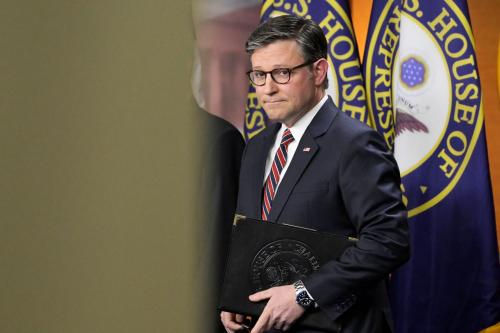The failure of the super committee speaks volumes about the condition of our political system, and especially of the Congress. Other bipartisan groups outside of Congress have shown that it is possible to achieve a compromise. Bowles-Simpson and Rivlin-Domenici were both able to craft proposals that included a reasonable balance of both spending cuts and revenue increases and which included enough total savings to put the nation on a fiscally sustainable path.
The super committee failed not because of a lack of good options and not even because of big philosophical differences. These other groups have shown that these need not be insurmountable hurdles. The problem, in a word, was politics. To be more specific, the problem was taxes.
Now we are into the blame game. Each side tells the story from their own slightly distorted perspective, but the Republican distortions are, in my view, far more egregious. Having accepted $900 billion in cuts to discretionary spending as part of the Budget Control Act enacted this summer, Democrats were naturally loathe to accept another all-spending-cuts package. The Republican refusal to put taxes on the table led to the usual stalemate. However, Republicans evidently realized that this would not be a winning strategy with many independent voters. So they ginned up several proposals that contained token amounts of new revenues, hoping—probably correctly—that the public wouldn’t notice how ridiculously small these proposals were. They may also be hoping that no one will notice, in the heat of an election year debate, that these small revenue increases were accompanied by an effort to insure that the Bush tax cuts would be permanently extended and that, in addition, taxes would be reduced below current levels, especially for the wealthy.
It is not just the public’s trust in government that has been dealt another blow by the super committee’s failure, it is also the economy. Democrats had hoped to extend existing payroll tax cuts and unemployment insurance benefits and they, too, fell by the wayside in these negotiations. The lapse of these measures at the end of this year could knock about a percentage point off of GDP growth in 2012.
Where do we go from here? According to the law, there are now supposed to be automatic cuts in defense and nondefense spending to the tune of $1.2 trillion over the decade. However there is much talk about changing this law and rescinding the required sequester. Even should these cuts go into effect in January 2013, they would close only a small portion of the budgetary gap we face over the coming decade. So the next big fight will likely occur during the lame duck session of Congress in 2012 when both sides will have to decide what to do about the expiration of the Bush tax cuts. This time, it is argued, Democrats may well have the upper hand since the tax cuts will expire automatically if the two sides are, once again, unable to agree on a plan. The $64 question is whether Democrats will allow this to happen or will, instead, insist on preserving tax cuts for the middle class. To be sure, if the economy is still depressed, it would not be a good time to raise middle class taxes. But any effort to temporize or preserve the tax cuts for some groups would require legislative action, giving Republicans renewed leverage to maintain all or most of the cuts.
Maybe by then there will be groups occupying Washington instead of Wall Street.
The Brookings Institution is committed to quality, independence, and impact.
We are supported by a diverse array of funders. In line with our values and policies, each Brookings publication represents the sole views of its author(s).



Commentary
Op-edWill the Super Committee Hit Congress Hard?
November 22, 2011